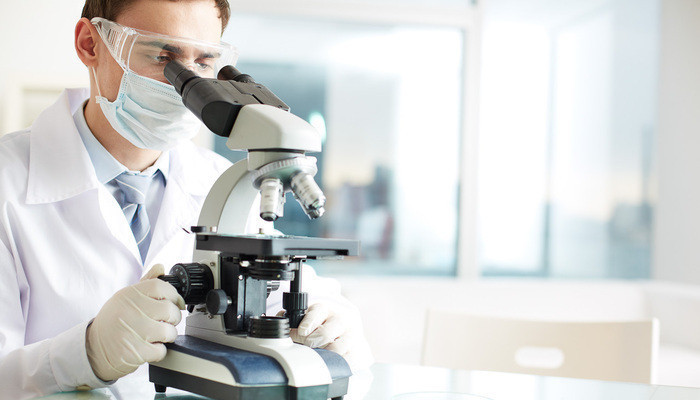
As an apprentice clinical scientist, you will analyse samples from patients’ blood, urine, or bodily fluids to help diagnose sickness, treatment, and therapy.
You’ll often work in a hospital laboratory, evaluating and confirming the results of these samples and advising physicians and general practitioners on the correct use of tests and any necessary follow-up investigations.
Responsibilities
Throughout your apprenticeship, you may help:
- research, develop and test methods of diagnosing and treatment
- collect and analyse complex data to help develop treatments
- assess different parts of the body to diagnose abnormalities
- advise medical staff of how to use products and equipment
- investigate the causes of illness or death
- study cells or diagnose and analyse blood disorders.
Salary
- Apprentice clinical scientists are usually employed at Band 6, starting at £32,306. Agenda for Change (AfC) pay rates
- Once qualified, you’re likely to be employed on Band 7 – £40,057 to £45,839.
- Salaries for principal and consultant scientists range from £47,126 (Band 8) to £108,075 (Band 9), depending on your experience and training.
Working hours
You’ll usually work a 37.5 hour week and may work a shift pattern, including weekends and nights, as laboratory services operate on a 24/7 basis.
Working environment
You could work in an NHS or private hospital, in a laboratory or at a university.
You may need to wear protective clothing.
Qualifications
Qualifications you can achieve as an apprentice clinical scientist include:
- Level 7 Clinical Scientist – Entry requirements for this level include a bachelor’s degree, a Level 4, 5 or 6 apprenticeship, a degree apprenticeship or a relevant industry qualification. This qualification will take 36 months to complete.
Skills
On a clinical scientist apprenticeship, you’ll learn:
- knowledge of biology
- thinking and reasoning skills
- excellent verbal communication skills
- the ability to use your initiative
- science skills
- to be thorough and pay attention to detail
- complex problem-solving skills
- maths knowledge
- to be able to use a computer and the main software packages confidently.
Employers
Most clinical scientists working in biochemistry are employed in clinical biochemistry/chemical pathology departments in hospitals.
Professional development
Once accredited, you must keep up to date on improvements in research and analytical procedures, as well as hone your laboratory and administrative skills. In addition, to keep your registration with the HCPC, you must participate in continuing professional development (CPD).
After accumulating experience (usually at least one year after registration), you may apply to the Higher Specialist Scientist Training (HSST) programme to learn how to become a consultant clinical scientist. This tailored five-year workplace training programme includes doctoral-level studies. In addition, you must be a Fellow of the Royal College of Pathologists (FRCPath).
After completing the HSST programme, the NSHCS offers a Certificate of Completion of Higher Specialist Scientist Training (CCHSST), which you may use to join the AHCS HSS Register.
Membership in The Association for Clinical Biochemistry and Laboratory Medicine (ACB) is advantageous for students pursuing the FRCPath since it allows networking and access to professional assistance and training.
If you wish to progress in academic or research roles at a university, you must publish your results in a relevant journal and present them at conferences.
Career prospects
There is a well-defined career route inside the NHS. After graduation, you may move through the grades by gaining experience and undertaking more training, study, and research. However, promotion is based on merit, and you may need to shift to various hospitals to take advantage of available opportunities.
You might specialise in endocrinology, toxicology, immunology, or molecular biology if you have experience.
As your career grows, you will likely be given more supervisory duties for the laboratory’s operations. Progression to consultant requires further training via the HSST programme. With promotion to deputy head or head of department, control of a large department is required. Contributing significantly in your area of expertise may help you move to a senior position.
There are opportunities to go into clinical research or to take part in training and registration assessments. Joining professional organisations, taking on external professional responsibilities, or moving into advisory roles may all help you progress your career. For example, you might go to general management roles in the NHS or industry.
